(Yes, this one is coming out late and thus covers a couple of weeks of Houston Rockets basketball, and is thus very long… but in keeping up with the Rockets’ season, that seems to make sense, right?)
One more impressive week down for the Houston Rockets. Houston is 3 – 4 since our last Round-Up, with both decisive victories and embarrassing losses. The Rockets continue to post league-leading defensive numbers and, with John Wall on the floor, shows glimpses of one of the league’s best offenses as well. The issues have been stretches of offense, and the times where Wall isn’t on the floor… Which has been a lot, as he is currently still on a minutes restriction and not playing in back to backs.
Houston continues to navigate a friendly stretch of their schedule with a revolving roster. The Rockets (finally) had the same starting lineup for a three-game stretch (Portland, New Orleans, and Oklahoma City) before needing to alternate John Wall and Victor Oladipo on nights of the back-to-back. Then, with Oladipo on the bench, Christian Wood suffered an ankle injury against Memphis that may keep him on the sideline for a while. Worth noting- it was the same ankle as the injury earlier this year, and it appeared to be much more serious.
Throughout the alternating availabilities, Stephen Silas has quickly become one of the many likable Rockets other NBA fan bases root for. Silas has spunk, is impressive out of timeouts, and continues to demonstrate a fight for his players that is inspiring. Even in the most desperate moments, like the midst of an awful fourth quarter against Charlotte, Silas clearly is intentional about getting better each day and controlling what the Rockets can control. While he is the rookie head coach previous Rockets’ stars didn’t want… he’s clearly the passionate one these Rockets thrive under.
Let’s take a look at how Silas’ squad faired over the week:
Win over New Orleans Positives
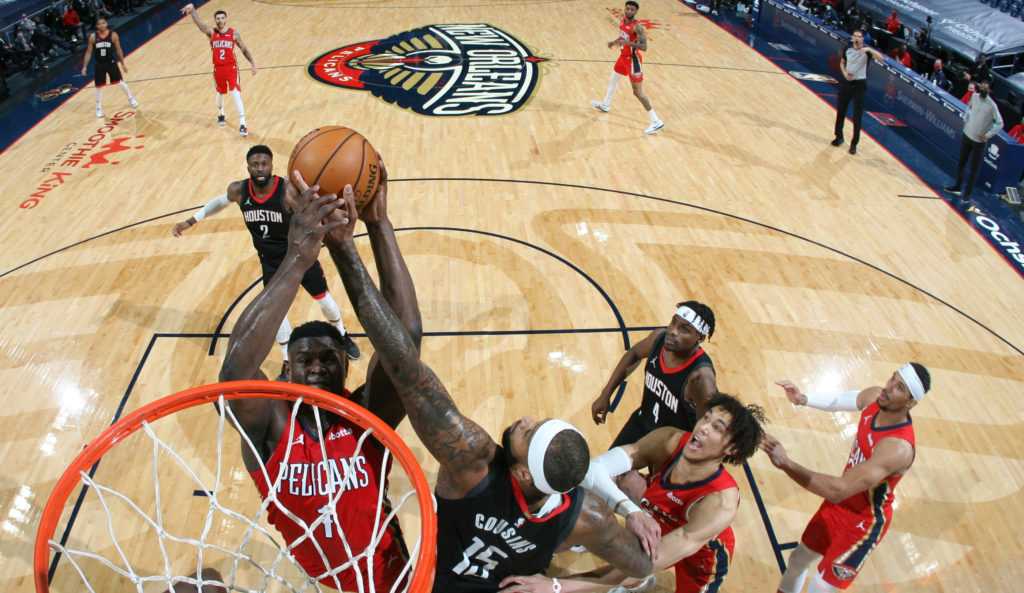
Honestly, for the first 14 minutes of play, it looked like it would be hard to write the “positives” from this game. New Orleans brought more energy, had big dunks from Jaxson Hayes and Zion Williamson, and even had a unicorn Williamson three to end the first quarter.
And then, Houston flipped the script. The Rockets were down 10 points with 11:20 to go in the second quarter… and were up by 18 at the end of it. The turnaround was a function of a 48-point quarter offensively and a 22 point quarter defensively.
Christian Wood looked like he has grown into his defensive role. At this point, he is the focal point of the Rockets’ offense and defense. He played almost the entire second quarter, and had 16 points, five rebounds, and had a steal and a block. Wood did a great job protecting the rim in both backside and drop coverage. He was effective in the dunker spot offensively and hit two threes in the final three minutes of the half. Simply, Christian Wood was all over the place.
But the offensive force of the game, including and after the second-quarter run, was John Wall. Wall only had fifteen points, but his aggression to the basket collapsed the defense. Whether directly on his kick-outs or after swinging the ball away from a scrambling Pelicans defense, Houston shot over 43-percent from the three-point line. Wall’s swift attack past Lonzo Ball, Josh Hart, and other Pelicans defenders was the spark plug that re-energized the Houston Rockets.
Another encouraging thing from the Pelicans win was that Houston showed an ability to switch against such varying body types. Eric Gordon and Victor Oladipo held their own with the longer, rangier Brandon Ingram, while Jae’Sean Tate and PJ Tucker managed to limit Zion Williamson’s effectiveness.
Win over New Orleans Problems
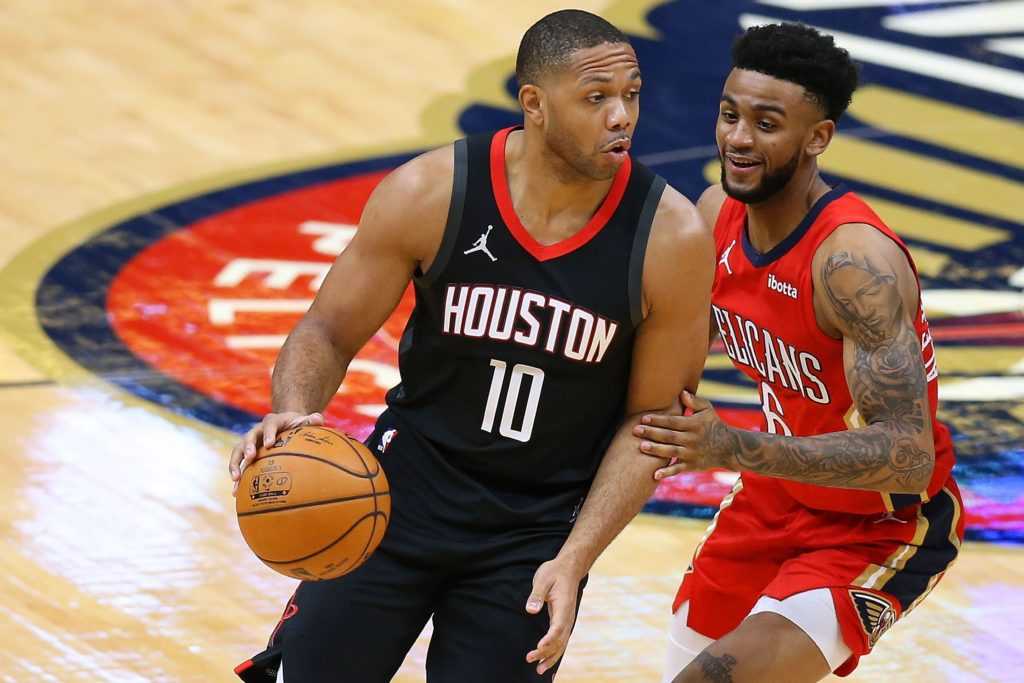
The Houston Rockets won the second quarter by 26-points… and lost all three of the other quarters. Houston started slow and finished slower, but was saved by an incredible 11-minute stretch. New Orleans won the rebounding battle, the turnover battle in three of four quarters, and definitely won the “garbage” minutes at the end of the game.
Zion Williamson had to work hard for his 26-points, but he was much more effective as a small-ball center than as a power forward alongside Steven Adams.
Houston can expect Wall to generate open threes all season. When he is in the game, he stresses a defense and punctures the lane as well as anyone. What they can’t expect is him to shoot 66-percent from the three-point line himself. Wall’s four three-pointers were back-breaking, and it’s unlikely that he will shoot twice as good as his career average every time they need him to. Wall has shot the ball better in Houston than in his nine years in Washington, but New Orleans caught him on fire.
The Houston Rockets’ recipe worked on January 30th, against New Orleans… but it’s not something that they can bank on.
The New Era: W.O.W. Factor
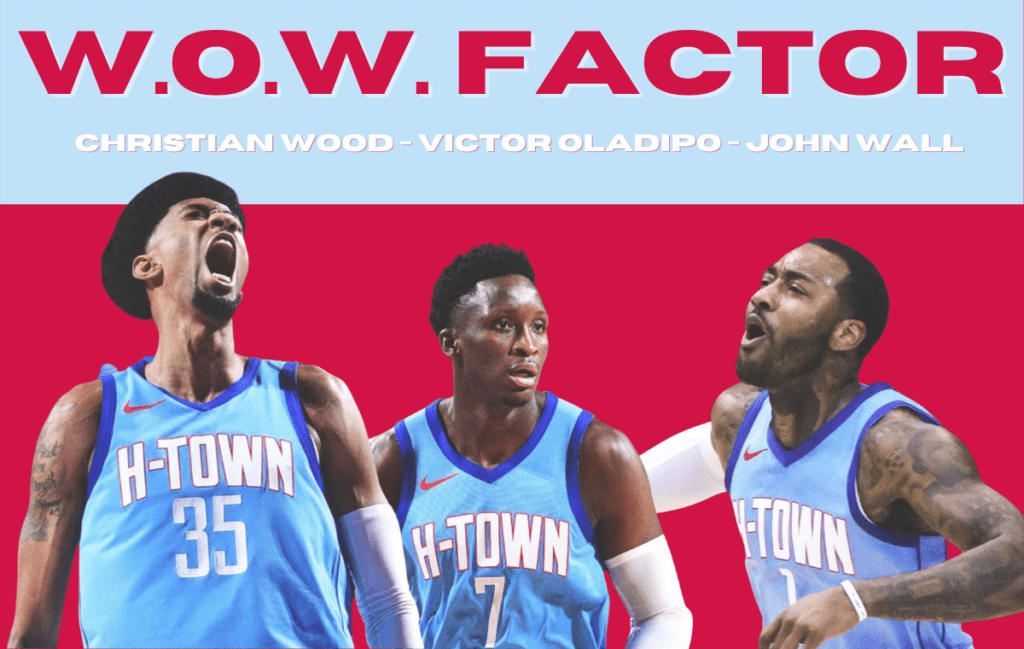
This came was the beginning of a stretch of Houston Basketball that Rockets’ fans hope lasts for a long, long season. The “W.O.W.” factor (John Wall, Victor Oladipo, and Christian Wood) was in full effect. New Orleans was just the trio’s second game together, but they combined for 62 points, 16 assists, and 18 rebounds. The future of the Rockets, as it stands now, rests heavily on their W.O.W. factor. If they can get that kind of production consistently, they can W.O.W. anyone. And they can’t all three be on the floor? “Wow” may sound a lot more like a “woe.”
Win over Oklahoma City Positives
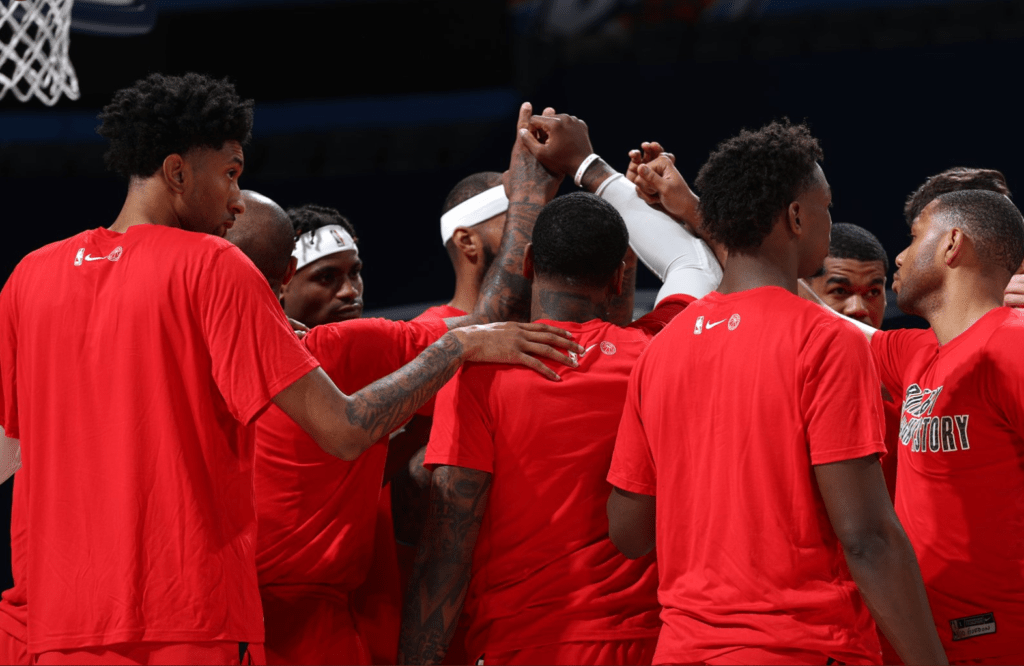
We could start at the start of the game, where the Houston Rockets opened with a 48-24 lead after the first quarter. This was the second time in three days Houston had a 48 point quarter, and the second time the game was put away early because of a simultaneous run of tremendous defense and efficient offense.
Wall entered the game with a similar swagger he left the previous with. He walked up into a dribble three, and his second shot was a catch and shoot three off a hammer screen and an Oladipo assist. The Rockets were efficient when they used Wood as an on-ball or off-ball screen, he was a punisher in transition, and his ability to hit the trailer three in a secondary break really put the Thunder on their heels. The quarter came to a close on an Eric Gordon four-point play, without him throwing his hands in disgust at the referee. Everything went their way to open.
The small-ball ‘kets continued their efficiency with Jae’Sean Tate playing the center position, and all Houston “bigs” (whether they are actually big or just play big) made guys like Al Horford and Darius Bazley work hard for their points.
What was clear in this game is that the pick and roll options that get Christian Wood to the center of the defense, whether that is for above the arc for three or near the free-throw line nail, is Houston’s best offense. Wall and Oladipo provide different threats as the ball-handler, but both use Wood well as a pop or roll man. Other bigs, like the aforementioned Horford or Bazely, have trouble deciding to drop and protect the basket or to hedge and force the drive because of how many options the simple set really can create.
In a game where the subs played considerable minutes, Houston posted a defensive rating of 101.4. While that’s close to league average, every Rocket in uniform had over five minutes in the game, and no Rocket played more than 27 minutes either.
Win Over Oklahoma City Problems
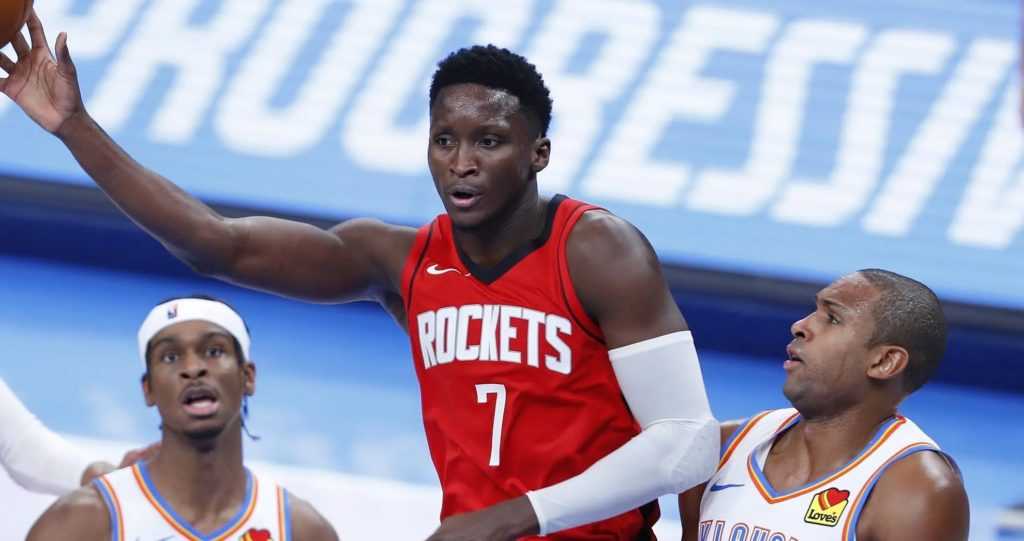
Houston’s small-ball made the OKC bigs work hard… but couldn’t get them off of the floor. The goal in a small lineup has to be to dictate what the other team can do. Your team is small and has more space to drive with all five guys on the perimeter. There’s no help from the dunker spot or “T-up” big clogging the lane. Your true-shooting-percentage needs to show you’re getting easy lay-ups on drives or open kick-out three’s on collapsed defenses… either of which will make a traditional set, with less efficiency, on the other end lose in the long run. Houston shot the ball extremely well and did the part on offense… but (aside from the first quarter), OKC was able to just “do what they do” on offense and keep relatively close, per quarter, in the second, third, and fourth.
Part of that is normal. The human element is that you let your guard down when you’re up 24 that early. Houston did not stop getting good shots. But it’s worth noting that they didn’t force the Thunder into new things.
Loss to Oklahoma City Positives
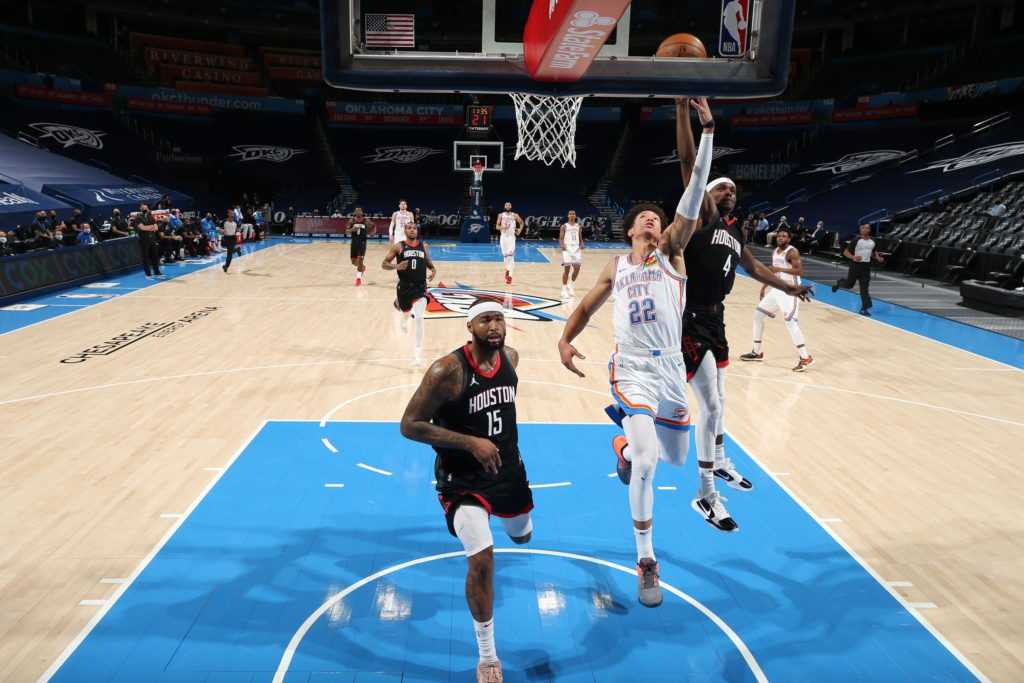
John Wall sitting out this game (he always misses one of the back to backs) was noticeable in the energy from the tip-off. The same swaggering Wall threes to open the game and his blazing speed out the gate were both missing. But Houston moved Eric Gordon into the starting lineup and went toe-to-toe with the Thunder for most of the first half. Defensively, even without Wall, Houston held Oklahoma City to just 54 first-half points. For reference, the Rockets had nearly that many in a quarter twice earlier that week. The problem became, without Wall, the offensive playbook shrunk.
Houston did generate good looks without Wall running the offense, but they weren’t as easy as they had been the previous meeting. The Rockets, encouragingly, were able to cut the lead at the end of quarters and make it feel like they were never really out of reach.
Loss to Oklahoma City Problems
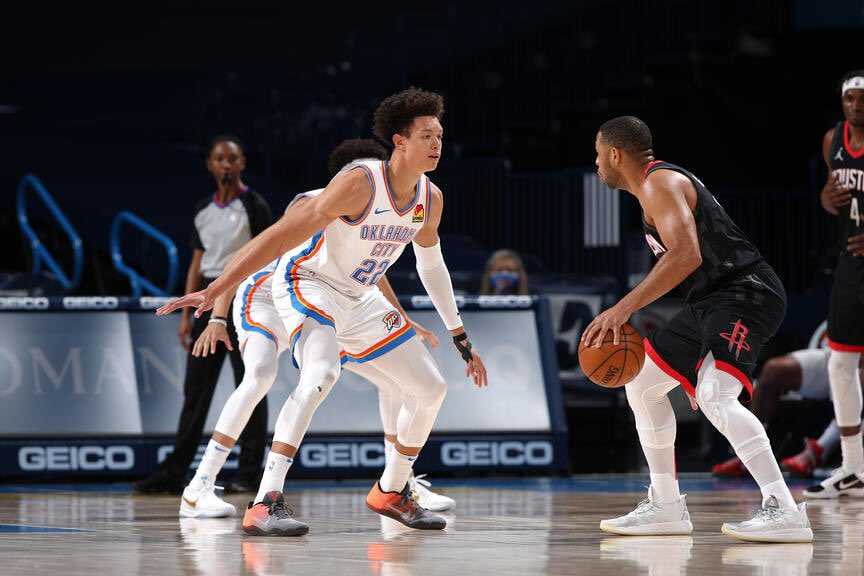
While much of the offensive struggle can be “written off” as missing Wall, the Houston Rockets need to have more options when kick-out threes aren’t falling. While raw points aren’t a great measure- the Rockets, bluntly, gave up two fewer points in the loss than they did in the win. It’s not hard to see the issues were with scoring the basketball.
Houston shot 26.1-percent from three, on 46 attempts. At some point, the Rockets needed to generate different looks. Wall has been the driving force in diversifying the attack, but Houston needs someway to do it that doesn’t rely on his health. He will miss half of the back to backs all season long, and they can’t afford to just “toss” those games, or leave them up to whether or not the threes are falling.
Win Over Memphis Positives
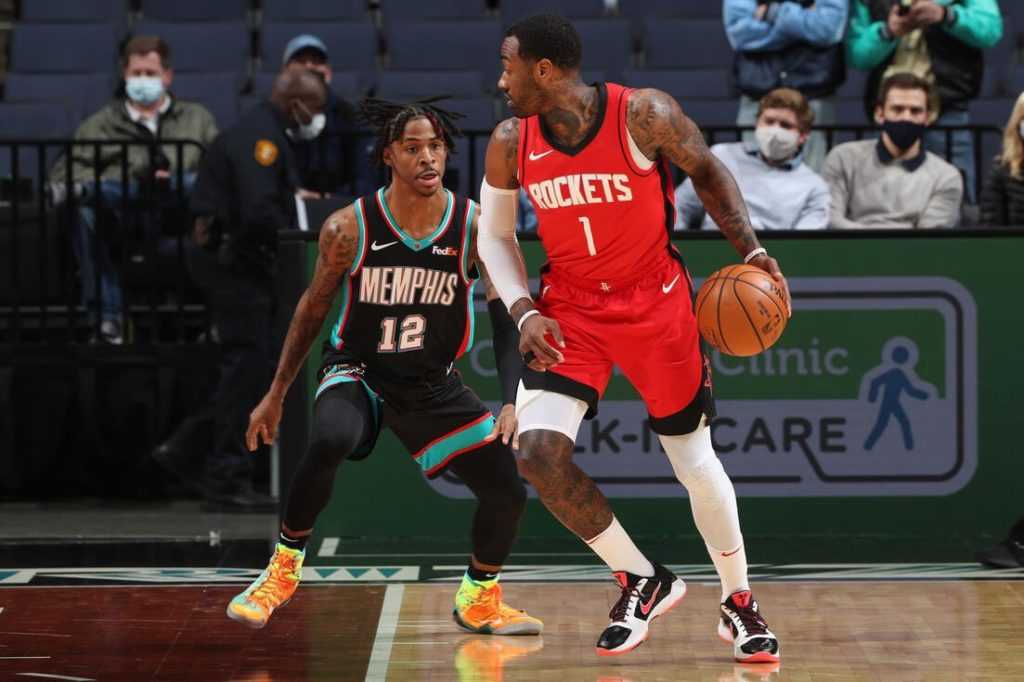
With John Wall back on the floor, the Houston Rockets moved at a different speed than they had the night before. Houston missed Victor Oladipo, but the speed of Wall really opened up the game. He began the game attacking the paint and kicking the ball out to Gordon and Tate. Wall pushed the break for a trailing lob to Wood. He truly runs a beautiful offense, and it was nice to have him back.
The difference in the game came in the second quarter when, like in most of Houston’s wins, the Rockets combined tough three-pointer making with tougher defense. As great as Ja Morant and the young Grizzlies are, DeMarcus Cousins and the undersized Jae’Sean Tate were able to give them problems in drop and switching coverages, respectfully. The run really exploded in the last few minutes of the half, when Houston took a one-point lead to a to a 13 point lead behind a flurry of threes.
Houstons run continued into the third after the teams swapped baskets, and Houston maintained a comfortable lead for the rest of the night. Christian Wood was a force as a deep shooter, playmaker, and fast-break finisher. If 2021 was going to be the “Christian Wood All-Star” campaign, his game against Memphis (until the injury) was the commercial.
Win Over Memphis Problems
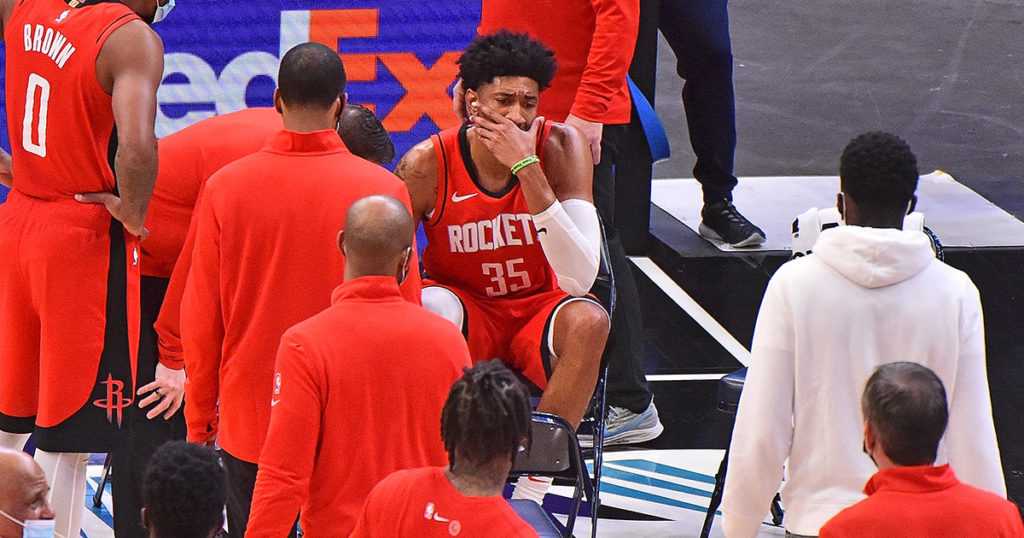
While the rest of this analysis is schematic, the clear and obvious negative takeaway from this game was the injury to Christian Wood. Wood went down in the second half with an ankle injury that appeared bad.. MRI results came back hopeful in the following days, but as of the time of this being published he is still out with no real timetable to return. He is the center, no pun intended, of what the Houston Rockets do. He was finally shining on a (relatively) national stage, and it is awful to see him continue to have to sit in sweats while the Rockets are on TV.
Memphis was susceptible to the Houston Rockets’ drop coverage because they can’t shoot in the midrange very well. However, the Grizzlies still had a strong offensive game in the paint and behind the arc. Where Houston has run into issues with this defensive strategy is against the Phoenix Suns and LA Clippers of the world who can also capitalize on the mid-range jump shot. Those teams take advantage at all three levels, and thus exploit holes in the defense.
The other thing that this game demonstrated is how dependent this roster is on a few of its players with health problems.
Houston did not have Oladipo, who could have helped in the mid-range defense, because he won’t play back to backs this season. The Rockets were visibly different with Wall, who missed the night before because of the same. And then, near the end of the game, Christian Wood went down with a second injury to the right ankle.
It’s not that any of these guys can help the injuries they’re coming back from. But the Rockets shifting lineups make it hard for the team to grow chemistry. Thus, while Houston is “gaining chemistry” at 50 miles per hour, teams with more regular lineups are “gaining” it at closer to 100. For a team that completely changed its identity with a blockbuster trade in early January, Houston needs to work hard to keep pushing. It is encouraging to see that this could be a much better team in May and June than it is today… but it hurts to see the key members in sweats every night.
Loss to San Antonio Positives
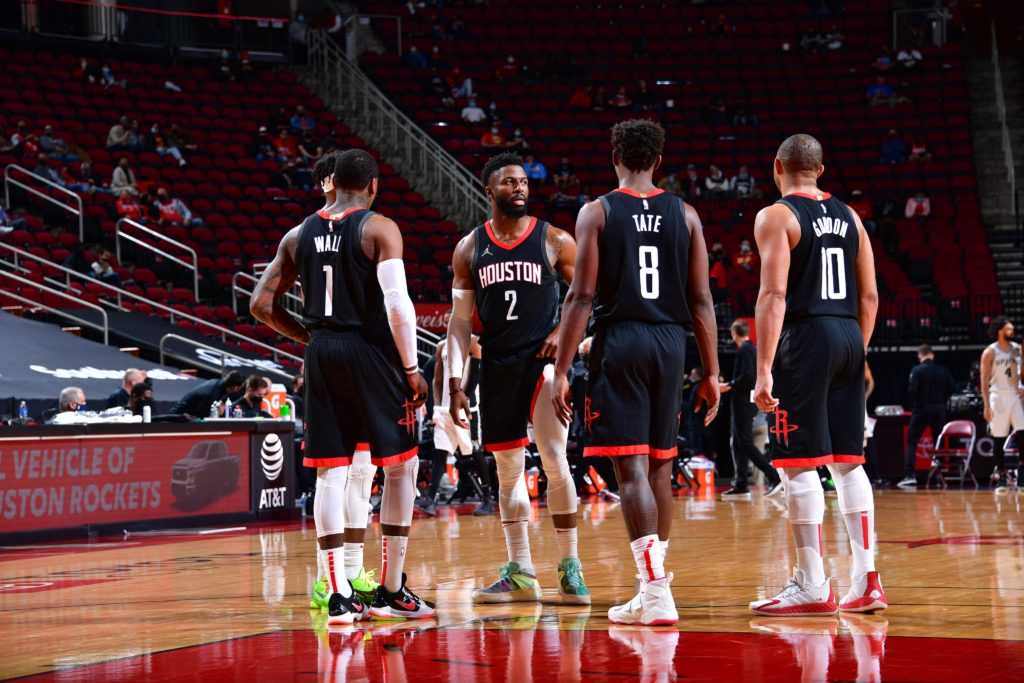
Well speaking of sweats… Houston desperately missed Christian Wood against San Antonio. Wood’s absence looks like it will be a couple of weeks as of February 6th, and the Rockets are going to need to find some way to rotate through bigs without him. Houston started this game with DeMarcus Cousins. Cousins hasn’t looked like himself since a couple of seasons ago, but he did play as well on the defensive end as he had all year. Cousins’s counting stats (two blocks, one steal, and 11 rebounds) were good and, because he spent a lot of time on Jakob Poeltl and Drew Eubanks he didn’t get challenged off the dribble in the same way he’s had trouble with this season.
John Wall did, in a close loss, take over the game. His 27 points and seven assists were energizing, and San Antonio’s backcourt had trouble keeping him in front of them the whole game. Eric Gordon found the same success in driving past defenders and shot the ball well from deep. Gordon’s catch and shoot threes from the wing pair well with Wall’s attacking mindset, and when they are able to add the matchup nightmare Christian Wood back to the free-throw line area they’ll be a tremendous threesome.
David Nwaba and Danuel House both shot well from deep, which was very welcomed. A year ago, House’s contributions from beyond the arc were a key part of the Rockets’ success. And, if Nwaba can be a consistent deep threat, Houston would love to have his defensive presence on the floor for longer stretches.
Loss to San Antonio Problems
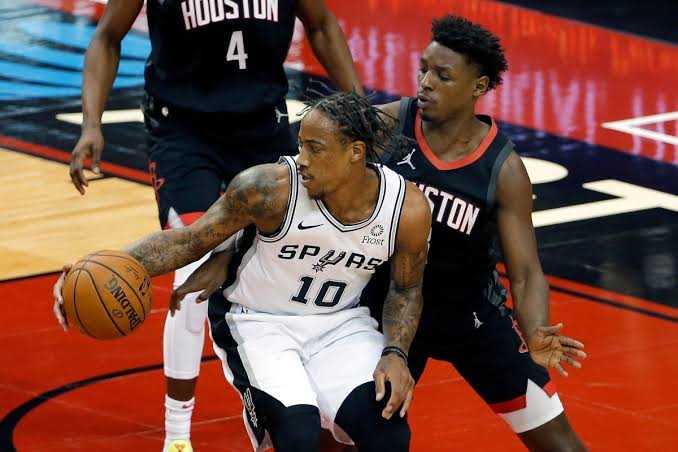
Yes, I understand this was in large part because of the limitations of the roster with Christian Wood hurt… but drop coverage on the two-five pick and roll was brutal. DeMar DeRozan is a midrange jump shot killer, and San Antonio is old school in how much they use all three levels of scoring. We’ll hope this is a personnel issue, but any move that allows for Drew Eubanks to get double-digit points, and a huge dunk, is not great.
This game was also the most Oladipo has been visibly recovering. Oladipo, before a slew of injuries, was explosive and strong at the two-guard spot. He was able to explode both horizontally towards the basket and then vertically at the rim. Currently, it looks like he’s having to pick one or the other. This makes total sense, he suffered a quad injury that sidelined him for over a year. He came back just before the NBA shut down in 2020, and sat out the restart bubble in the fall. Oladipo is still working his way back a year after his return, but Houston may need him to be 100-percent to really be at their best. Especially with injuries across the rest of the roster.
Loss to Charlotte Positives
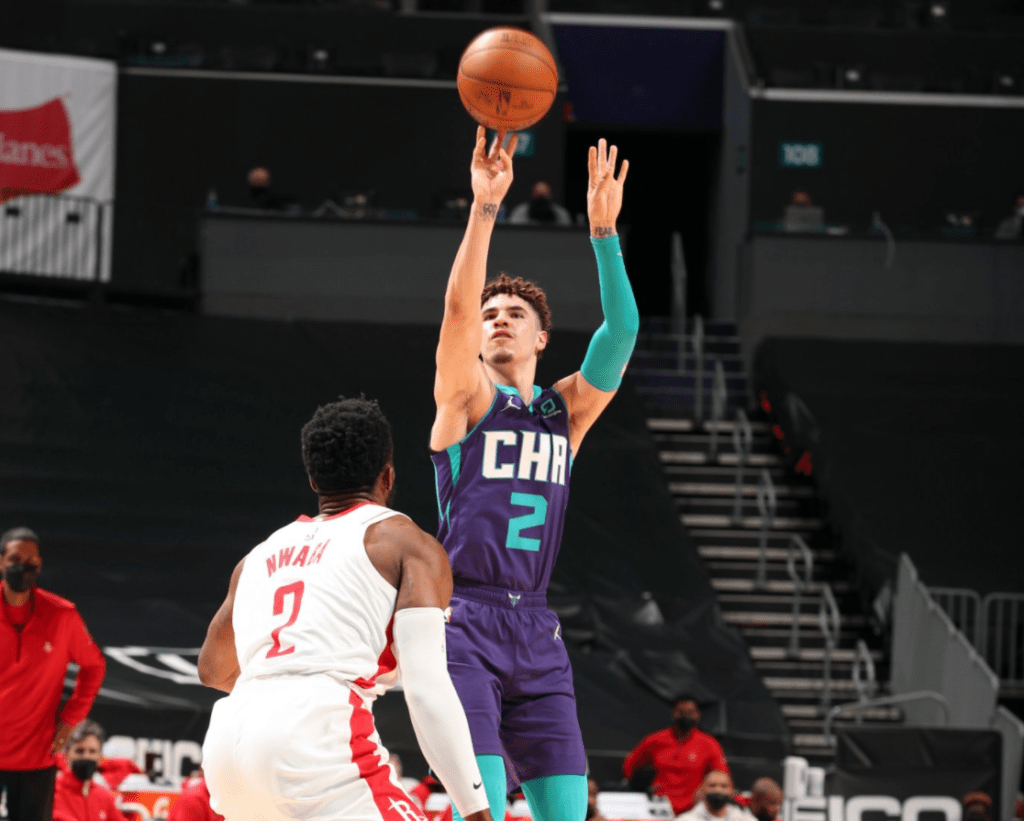
There are not a lot of things to write here. Houston clearly missed Gordon, Wall, and Wood on both ends of the floor. It’s worth pointing out that if the playoffs started today Charlotte is a playoff team. The blossoming relationship with LaMelo Ball and Miles Bridges is explosive. Houston was competitively in the game for 40 of the 48 minutes before they ran out of gas offensively. Houston entered the fourth down just three points… and lost by 25.
In focusing on the first three quarters, and finding positives, Houston was able to stay in the game without being super hot from deep. The Houston Rockets shot just 30-percent from three, 50-percent overall, and were only down by four at half. In previous games, when Houston shot this poorly, things were out of hand much earlier.
Loss to Charlotte Problems
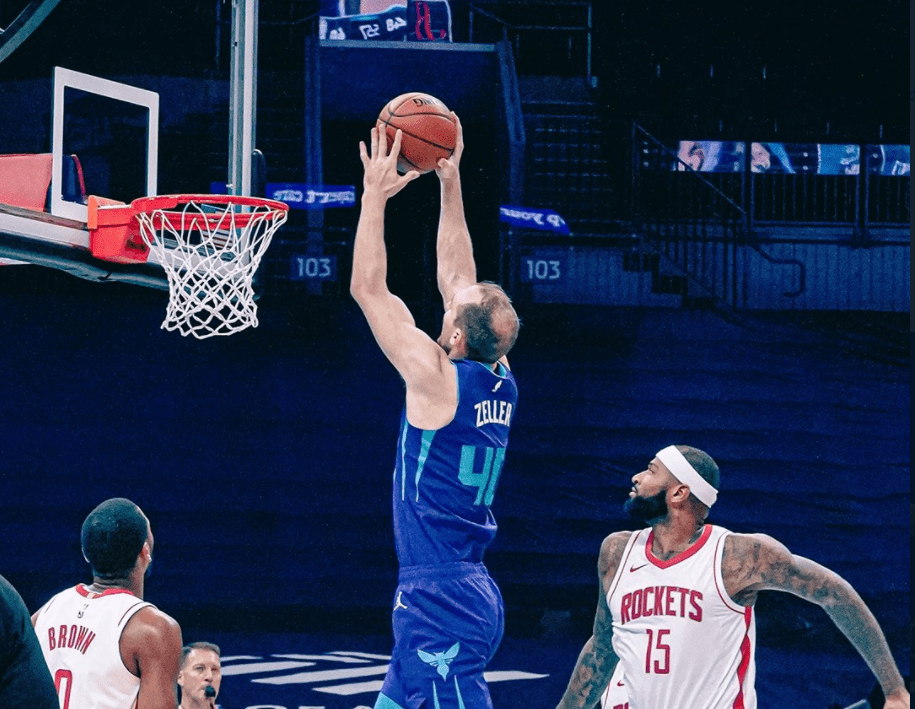
Ok let’s just get it out there: Houston shot 10.5-percent in the fourth quarter. They were 2 of 12 with five turnovers against a defense that, on the season as a whole, is in the bottom half of the league. We could break down schematics, ask how to better involve role players, and try to plug up the holes in the dam… but at some point, scoring just seven points in 12 minutes needs more than that.
I’m going to keep my blood pressure down and leave it at that. Allowing 29 points in the fourth defensively isn’t awful. Rewatching the fourth quarter was.
Loss New Orleans Positives
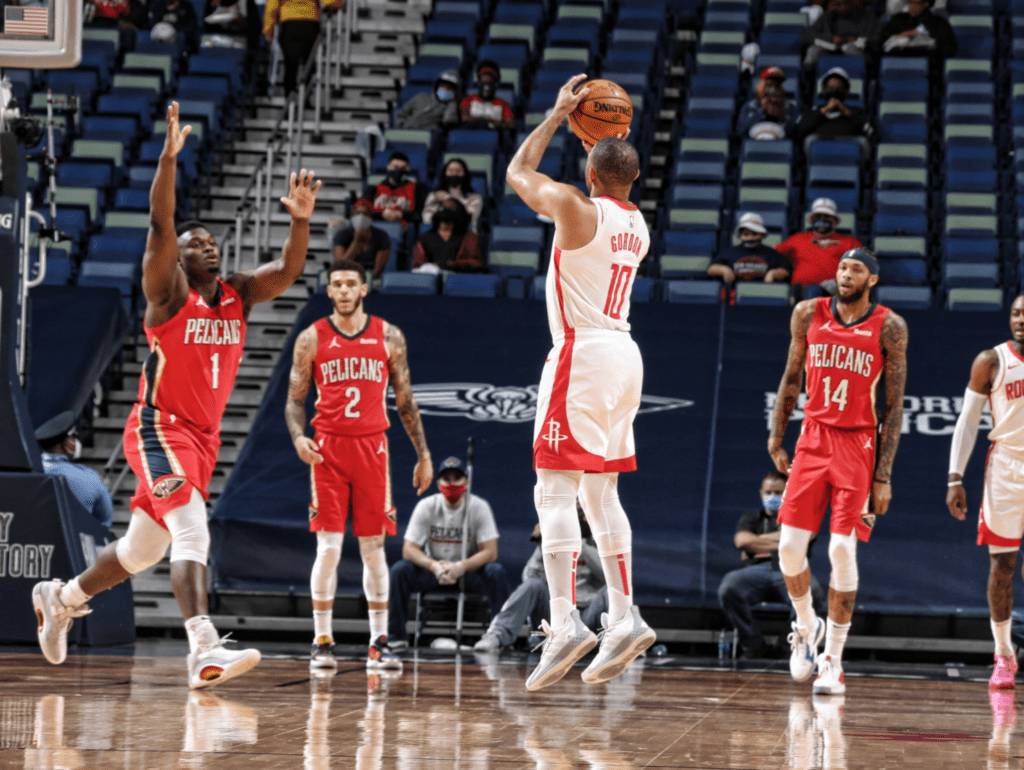
For the majority of the first half, and stretches of the second, the Houston Rockets were able to get to the basket. Whether it was on an initial Wall action and kick, or a pick and pop into swinging away from a rotating defense, the Rockets got Zion Williamson and Steven Adams in foul trouble, early.
Houston also continued to produce (mostly) open shots. The rough three-minute stretch to end the first half was missing a lot of good shots, not forcing bad ones.
Houston does not have an offensive mistake eraser like they’ve had for several years in recent memory, but they also run efficient and intelligent sets. Wall is the focal point, and his decision making is only amplified in the Stephen Silas system. Even if this game featured a lot of missed shots, Houston regrets taking very few of them. Just have to make the open shot when it’s your turn.
Loss to New Orleans Problems
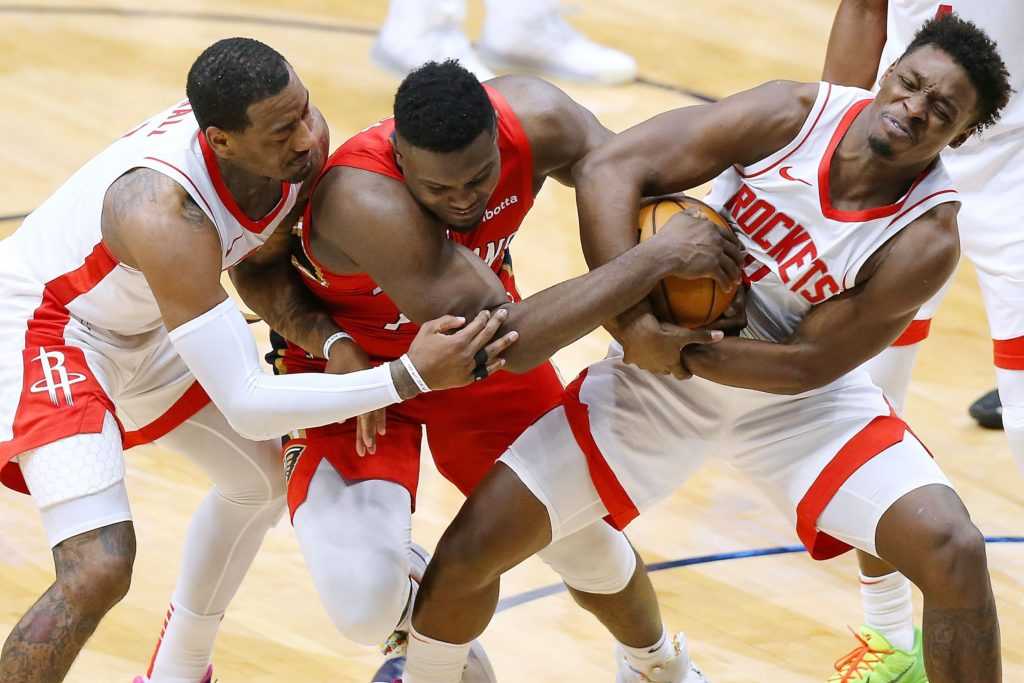
With no Christian Wood, and with Boogie Cousins’s current limitations defensively, the Houston Rockets were forced into playing a lot of small ball. With a team like New Orleans, that means you’ve got undersized defenders on Adams, Williamson, and Brandon Ingram at various points of the night. That is tough on both ends, but especially in limiting the other offense to one shot.
In the early stages of the second half, that size advantaged changed from second-chance baskets to bully baskets.
The Eric Gordon minutes bear mentioning. Gordon has, mostly, been a net positive this year. However, he was a -40 in 33 minutes played. Understanding that the plus-minus is not an end-all-be-all statistic, it is reflective of how the game was going with him on the floor. Eric Gordon has been the fuel to the Rockets’ successes at various points of the season, but he was a problem for them against his former team in New Orleans.
This game also highlighted the issues with working so many key pieces back from such big injuries. Oladipo missed this game, and Houston missed his playmaking desperately when John Wall was out of the game. Wall himself is still on a minutes restriction. He had to watch while the deficit ballooned from 8-points to 19 before he entered the fourth quarter. And this is in fact where the Christian Wood injury hits hardest.
To date (February 11th), only two teams have used more different starting lineups than the Rockets. Part of that is the trade, COVID quarantines, and injury recovery. Houston knew, once they signed Cousins and Wall they’d be in for some of that, and they knew there would be an adjustment following the Harden trade. The constant was supposed to be Christian Wood. His growth into stardom was supposed to shine throughout a cast of characters moving around him. Now, that spot is one more rotating piece.






